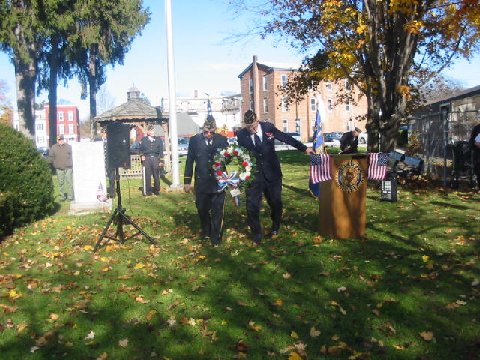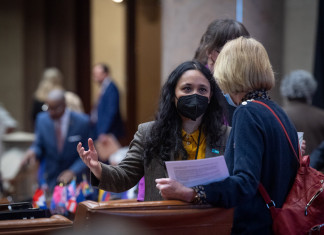
A decision on offering veterans a new school tax exemption was delayed till next year, but still triggered a spirited discussion at the Hyde Park Board of Education’s Feb. 27 meeting.
There was a full house at the meeting, when board chair Douglas Hieter explained that the board could not make a decision in time for the March 1 deadline. After the issue was raised at the Jan. 23 meeting, the board had set a public hearing on the topic for its Feb. 13 meeting, but that meeting got snowed out. So the already tight window left the board with few options to set another hearing, a move that requires 10 days’ notice.
The exemption was signed into law in December and allows school districts to decide whether to offer the exemptions, which for some veterans could equal more than a 25 percent reduction in their school taxes. Unlike some state tax credits, the exempted money would not come from the state but would have to be raised from the rest of the tax base.
To that end, Hieter also said that a presentation by Superintendent of Business Wayne Kurlander on how the exemption would impact the district’s tax rolls was also not ready.
“Because this is a serious decision that the board has to make…I have recommended that we not make a decision until the next year, so that we can gather more information and really know exactly what this is going to cost, specifically cost each and every taxpayer,” Hieter said.
Trustee Gary McGrath suggested that there be a public referendum rather than a vote by the board when it is time to decide on offering the exemption.
But Hieter said the board is legally required to hold a final vote. Trustee Glenn Watson suggested that there should at least be a simple non-binding question of “yes or no” given out to the audience at the final meeting to gauge public support for the exemption.
Trustee Kevin Sheehan then noted that the statistics Kurlander will eventually present should also be given to the community. And, he added, those numbers will be the deciding factor for his vote.
“It’s a wonderful gift that the legislature in Albany has handed…to our veterans; it really is. The reality is…other than making it available, they don’t tell you where the money comes from. They conveniently leave that part out,” he said.
Watson asked if there was a difference in the exemption offered for “…someone who is drafted and didn’t necessarily want to do this and someone who volunteered to get a career?” Referring to drafted soldiers, Watson stated “I think we owe you more.”
“I can’t make a distinction, to be honest with you,” Sheehan replied. The two continued to debate the matter until Hieter changed the subject by suggesting that the board might find “creative ways” to fund the exemption.
He also said he hoped Kurlander will be able to present the tax roll impact numbers to the board next month.
During the public participation section of the meeting several residents got up to speak on the topic.
Ralph Osterhoudt, Sr., who served from 1944-1946, said, “Why does everything have to go the money trail?…You’re spending money for almost everything, and I think it’s a shame that you can’t see clear to…recognize these veterans.”
Sue Tyson, a mother of a veteran, said, “There is so much you guys do not know that these guys go through – what hell they’ve been through — and they deserve something ‘cause they help keep you safe.”
On the other hand, Jennifer Harnan, another parent, said that the exemption is “not right in this economy.”
“If we had a strong economy, if we had strong housing prices, if people’s homes weren’t ‘underwater,’ if we weren’t the third poorest school district in all of Dutchess County, if we didn’t have lines out of our food pantries…if this was a good economy, I’d be all for it,” she added.
At the meeting, residents also talked about reassessment concerns.
Bill Gannon of Clinton and Dick and Norene Coller of Staatsburg, all said that they had spoken with State Senator Terry Gipson about the inequality of taxes due to a lack of a reassessment. Gannon said that he also wrote a letter to the state’s Attorney General on the matter and that it was transferred to the Public Integrity Bureau. The Collers noted that their taxes have gone up 40 percent in the last four years and that they are actively working with Assemblywoman Didi Barrett and Gipson to try to acquire more state aid for the district and that more aid has already been acquired.
Trustee Daniel Duffy told the Collers, “Hyde Park has the highest ratio of un-taxable land in the state” but that the district has seen “as little as an $8,000 bequeath” from the federal government to cover the non-taxable properties so far.
“Because Hyde Park has chosen not to fund a reassessment, the burden shifts to other towns,” Duffy added. If the veterans’ tax exemption is passed, he said, “it will commit Clinton, Rhinebeck and other areas to paying more [in taxes] because it’s an assessed value change.”







Facebook Comments